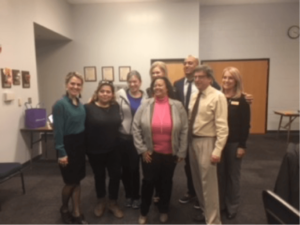This is the second in a series on mental health collaboratives in Texas. The first in the series covers Bexar County’s Collaborative Approach to Community Mental Health. This series aligns with our strategic focus on communities and collaboration.
Collaborative organizations can’t function—much less succeed—without community support. For mental health collaboratives, the stigmatization of mental illness and its omission from popular conceptions of primary care can make this an uphill battle.
But mental health concerns can only be sidelined for so long before a moment of crisis brings them out of the woodwork. Such was the case in Fort Worth, Texas when, nearly 20 years ago, a gunman with a known history of mental health struggles open fired on Wedgwood Baptist Church. It was the city’s first mass shooting.
Acting swiftly, the mayor of Fort Worth convened key local social service providers and implored them to identify gaps in the region’s mental health support infrastructure. That collaboration lives on today as Mental Health Connection of Tarrant County (MHC).
How Structure and Culture Create Sustainability
“The reason we’re still together and still going strong is that we’ve really seen benefit in working together,” said Patsy Thomas, president of MHC. “We can do so much more together than we can alone.”
Though galvanized by tragedy, the collaborative has sustained momentum over the years by way of an inclusive, volunteer-driven structure. Three tiers of membership—sponsors, agencies and individuals—are available to anyone interested in MHC’s cause, with funding coming from annual membership dues.
Even after two decades, Thomas remains the organization’s only full-time staff member. “Everything we do, we do collectively,” she said. “I get a lot of credit for the work that MHC does, but the truth is that the work would not be done if we didn’t have an army of volunteers.”
To facilitate strategic planning across sectors, MHC relies on a number of committees, each dedicated to a particular issue or programmatic function. An outcome-focused work ethic keeps operations efficient while promoting accountability and ensuring projects yield measurable gains for the community.
“If you build it, then you own it, and then you’re responsible for it,” said Thomas. “That’s been our philosophy the whole time.”
MHC makes a point of courting partners that operate inside and outside traditional clinical settings. This gives local mental health authorities and service providers the opportunity to engage and collaborate with institutions—of business, criminal justice, education and so on—that traditionally operate outside their jurisdiction.
The ongoing dialogue catalyzes projects like Reaching Teens, a pilot aimed at building resilience in local youth that coordinated the efforts and resources of 10 MHC agencies. “It’s important that we have a shared language—that we’re treating issues with the same trauma-informed, strengths-based approach,” said Thomas. “It’s created a culture. It’s changed the way we look at teenage behavior.”
Education as a Path to Resilience and Inclusion
At MHC, a high premium is placed on learning, both within the collaborative and the broader community. Looking back on the organization’s evolution, Thompson cites the decision to incorporate cultural competency as a crucial turning point. The concept didn’t factor into the scope of MHC activity until 2008, when Dr. Gloria Morrow was recruited to share her expertise and provide training for members.
Dr. Morrow educated participants about the California Brief Multicultural Competence Scale (CBMCS), a 32-hour curriculum that unfolds over the course of four days. More than 700 medical practitioners in Tarrant County have completed it since. “It really looks at not only you as an individual, but institutions and systems, too,” said Thomas. “It covers all the ‘–ism’s—racism, sexism, ageism, anything that creates discrimination. It’s very powerful.”
Current social issues hold considerable sway over programming, sometimes taking priority at the monthly meetings MHC hosts to hear community concerns. “They’re an opportunity for problem-solving, or for voicing reactions to something that’s happening in the environment,” said Thomas. “People can come and share information about what’s really going on with them.”
At present, MHC is cracking down on its goal to make Tarrant County a trauma-informed community. The heart of the initiative—now a decade in the making—is an educational program about building resilience in all aspects of community life. Intensive research, learning committees and expert-led symposia have paved the way thus far.
“Everything we do builds on what we’ve done before,” said Thomas. “There always seems to be another opportunity to take it up a notch.”

